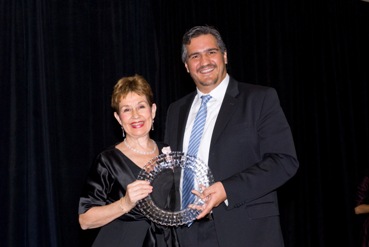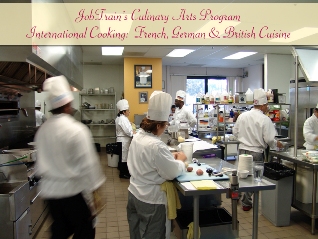Incorporating Mediterranean Produce on U.S. Menus
By Eric Stein, M.S., R.D.
‘ Tis the season for incorporating a wealth of Mediterranean-origin fruits and vegetables in menu development.
Tis the season for incorporating a wealth of Mediterranean-origin fruits and vegetables in menu development.
The spring season brings a major increase in the variety of fresh fruits and vegetables to markets around the country. Some examples of produce that come into harvest in the spring include artichokes, cardoons, citrus, fennel, an assortment of greens and lettuces, spring onions and an array of different herbs. While many of these items are common on restaurant menus in the United States, throughout a variety of cuisines, they also share a common trait that most are also used extensively in the Mediterranean diet.

 DC Central Kitchen’s Linda Vogler—who will present at CAFÉ’s upcoming Leadership Conference—helps transform despair into triumph for adult learners through food and service.
DC Central Kitchen’s Linda Vogler—who will present at CAFÉ’s upcoming Leadership Conference—helps transform despair into triumph for adult learners through food and service. Making students responsible for assessing their own performance can yield real differences in the way you teach and impact students’ attitude toward evaluation.
Making students responsible for assessing their own performance can yield real differences in the way you teach and impact students’ attitude toward evaluation. Teach students to communicate intent, enhance impact and add value by using business-building phrases and gestures at service.
Teach students to communicate intent, enhance impact and add value by using business-building phrases and gestures at service. Is teaching a world of different cuisines possible in only 50 minutes? Probably not, says Chef Weiner, but international cuisines can be successfully taught in a short series of classes.
Is teaching a world of different cuisines possible in only 50 minutes? Probably not, says Chef Weiner, but international cuisines can be successfully taught in a short series of classes. Educators seeking solutions for environmental efforts and teaching greener foodservice practices will find a wealth of information, products, services and contacts, May 22-25 in Chicago.
Educators seeking solutions for environmental efforts and teaching greener foodservice practices will find a wealth of information, products, services and contacts, May 22-25 in Chicago. Delmar, part of Cengage Learning and a leading provider of learning solutions for ongoing career development and education, announces the publication of Guide to Produce Identification, Fabrication, and Utilization (ISBN-13: 978-1-4354-0121-1, $58.49), a comprehensive guide to fruit and vegetables. Written by Brad Matthews and Paul Wigsten, this resource is part of the successful Kitchen Pro Series focusing on kitchen preparation skills from The Culinary Institute of America (CIA), the world’s premier culinary college, based in
Delmar, part of Cengage Learning and a leading provider of learning solutions for ongoing career development and education, announces the publication of Guide to Produce Identification, Fabrication, and Utilization (ISBN-13: 978-1-4354-0121-1, $58.49), a comprehensive guide to fruit and vegetables. Written by Brad Matthews and Paul Wigsten, this resource is part of the successful Kitchen Pro Series focusing on kitchen preparation skills from The Culinary Institute of America (CIA), the world’s premier culinary college, based in  Leaders of two travel and tourism giants came together for the April 5, 2010, groundbreaking of Florida International University (FIU)
Leaders of two travel and tourism giants came together for the April 5, 2010, groundbreaking of Florida International University (FIU)